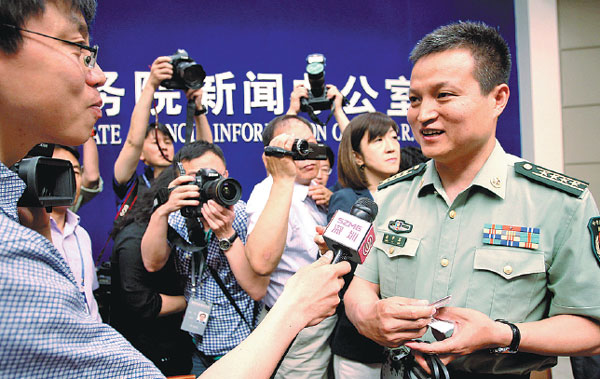'Active defense' policy reaffirmed
Updated: 2015-05-27 07:31
By Li Xiaokun(China Daily USA)
|
|||||||||
Landmark report clarifies military strategy and security challenges
Beijing issued its first white paper on military strategy on Tuesday, stressing "active defense" and highlighting more efforts on navy-building.
The document states that "some offshore neighbors" have taken "provocative actions and reinforced their military presence on China's reefs and islands that they have illegally occupied".
Vietnam and the Philippines have continued to build on some of China's islands in the South China Sea.
The white paper, China's Military Strategy, contains about 9,000 Chinese characters and was issued by the State Council Information Office.
It reaffirms China's adherence to peaceful development and its "active defense" military strategy. It interprets this policy as, "We will not attack unless we are attacked, but we will surely counterattack if attacked", adding, "China will never seek hegemony or expansion."
It mentions increasing security challenges posed by certain countries, citing the growing United States military presence in Asia and major adjustments to Japan's security policies.
Zhao Weibin, a researcher of Sino-US military relations at the PLA Academy of Military Science, said that although the white paper names some countries that pose security challenges, it has not been written to counter these, but to assess the situation objectively.
The paper was issued several days after a CNN reporting team aboard a US surveillance aircraft said the plane was warned repeatedly by the Chinese navy as it flew over a Chinese island in the South China Sea on which China was carrying out construction work.
Defense Ministry spokesman Yang Yujun said at a news conference on Tuesday that such constructions are comparable to the building of homes and roads on the Chinese mainland, given that there is "absolutely no difference from the perspective of sovereignty".
The island-building is "beneficial to the whole of international society" because it aids China's search and rescue and environmental protection work, he said.
Yang said the topic had been given prominence by increased surveillance activities and an effort to "deliberately play up the issue in order to smear China's military and raise tensions in the region".
The white paper said, "It is thus a long-standing task for China to safeguard its maritime rights and interests."
It said the PLA navy will gradually shift its focus from offshore waters defense to a combination of this type of defense and open seas protection.
The document reaffirms China's opposition to weaponization in outer space and its disapproval of an arms race there.
It also said that China will speed the development of a cyberforce and enhance its capabilities in cyberawareness and cyberdefense.
Yan Wenhu, a researcher at the Academy of Military Science, said, "The adjustment is necessary as long-range, precise, smart, stealthy and unmanned weapons and equipment are becoming increasingly sophisticated, and outer space and cyberspace have become new command posts."
While it is the ninth defense white paper issued by China since 1998, it is the first to focus specifically on strategy, rather than the broader facts and figures of the country's military.
Wen Bing, a defense policies researcher at the Academy of Military Science, said the document looks at the core and most sensitive questions concerning China's military and security policy.
Wen said China is one of few countries to publish white papers to clarify military strategy. The US, Russia and Britain have issued similar reports. "That is indeed a big step in China's military transparency," Wen said.
Wen also suggested that those reading the report examine every word, as "there are so many new expressions and ideas through which you can better understand today's PLA."
The paper also says that as Chinese national interests widen overseas, the nation will "strengthen international security cooperation in areas crucially related to China's overseas interests".
On future cooperation with the US, it says China intends to build a "new model for military relationships" that conforms to the two nations' "new model of major-country relations".
It will strengthen defense dialogues, exchanges and cooperation with the US military and improve the system for the notification of major military activities as well as the safety rule covering air and maritime encounters.
Kerry Brown, Sydney-based associate fellow on the Asia Program at Chatham House, the Royal Institute of International Affairs in London, said the new white paper sets out the key policy parameters for China at the moment, reaffirming what its core areas of concern are.
"There is a reaffirmation of its 'red lines'. The challenge now is how these 'red lines' are addressed with the other parties involved," he said. "The paper's reference, for instance, to China needing to defend its overseas assets is very important, as these are new issues that have never really been present in Chinese strategic thinking before."
Xinhua and Liu Jia contributed to this story.
lixiaokun@chinadaily.com.cn
|
Yang Yujun, spokesman for the Defense Ministry, talks to the media after a news conference on the release of the first white paper on military strategy in Beijing on Tuesday. Zhang Wei / China Daily |
(China Daily USA 05/27/2015 page1)

 California oil spill takes toll on marine mammals
California oil spill takes toll on marine mammals
 Ten photos you don't wanna miss - May 27
Ten photos you don't wanna miss - May 27
 Family photos for mountain-dwellers
Family photos for mountain-dwellers
 A young part-time chauffeur on the road
A young part-time chauffeur on the road
 Death toll from heat wave in India nears 800
Death toll from heat wave in India nears 800
 Tech giants shine on Intl Big Data Expo 2015
Tech giants shine on Intl Big Data Expo 2015
 Premier Li urges production capacity co-op between China, LatAm
Premier Li urges production capacity co-op between China, LatAm
 US honors war dead on Memorial Day
US honors war dead on Memorial Day
Most Viewed
Editor's Picks

|

|

|

|

|

|
Today's Top News
China cautions US over
South China Sea
China, Cuba emphasize confidence
Storms kill 16 in Texas, Oklahoma; Houston flooded
Obama to host South Korea's Park in mid-June
California oil spill takes toll on marine mammals
China issues first white paper on military strategy
China, Chile ink multi-billion-USD currency swap deal
Cleveland, US Justice Dept reach settlement over police
US Weekly

|

|








